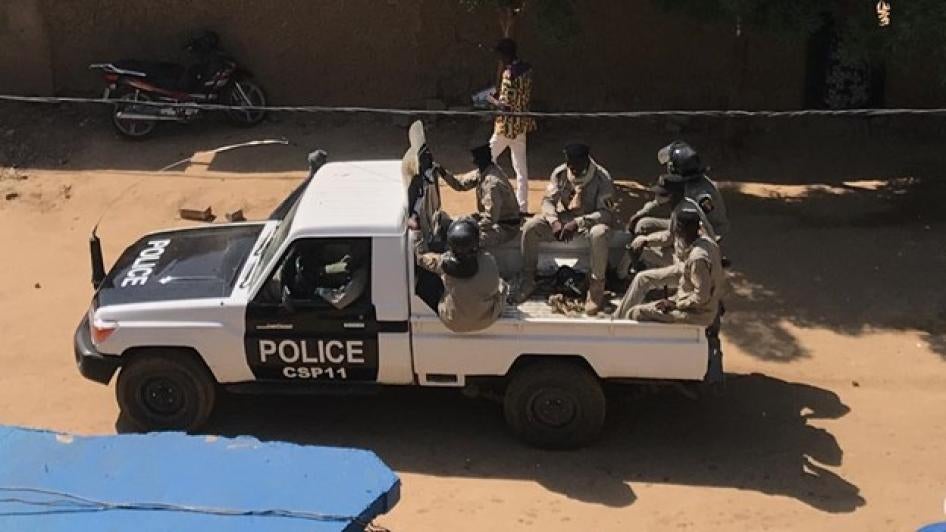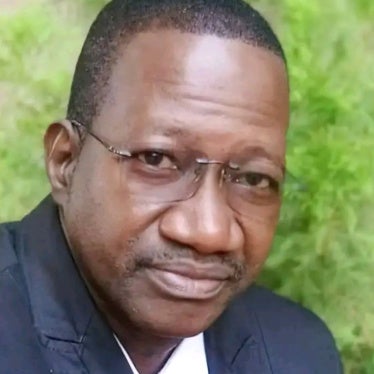One year ago, Chadian President Idriss Deby Itno was killed in clashes between rebels and government forces in Western Kanem province. It was the day after official results announced his sixth presidential mandate. The same day one of Deby’s sons, 38-year-old Mahamat Idriss Déby Itno, unconstitutionally took over the country. The head of parliament should have been elevated to the post.
Since then, Chad’s troubling human rights situation has only worsened. Violations - including unlawful killings, arbitrary arrest and detention, torture, and extortion, – have increased with almost no effort to punish those responsible. Human rights defenders are working in a more dangerous environment.
When a military council installed Mahamat Idriss Deby, it suspended the constitution and replaced it with a transitional charter and the promise of free elections within 18 months, after a national dialogue. The dialogue, scheduled for February, was not carried out, sparking growing calls both in Chad and outside for a civilian-led transition and credible elections.
Negotiations between Chad’s transitional military council (Conseil militaire de transition, or CMT) and representatives of armed groups are supposed to precede the dialogue. The first round of negotiations kicked off in Doha, Qatar’s capital, on March 13 but no private Chadian media have been allowed to attend and report on them.
The constitution is still suspended and there are few signs of democracy’s return. Mahamat Idriss Deby rules Chad with an iron fist, like his father, threatening and arresting dissidents and critics. His ministers provide disingenuous statements to try to explain away security forces’ abusive actions, and systematically deny allegations of abuse.
Demonstrations by the opposition, civil society or ordinary citizens have become difficult as the authorities have a zero-tolerance policy for dissent.
In the aftermath of the April 11, 2021 presidential election, security forces used excessive force, including opening live fire indiscriminately, to disperse opposition-led demonstrations across the country. Security forces killed at least seven people, wounded dozens more, and arrested over 700 people, during the protests, which were led by members and supporters of opposition parties and civil society organizations united under a coalition known as Wakit Tamma, in late April and May.. Several of those arrested reported being ill-treated, including tortured, while in detention.
On October 2, hundreds of residents of the capital, N’Djamena, joined members and supporters of Wakit Tamma to protest the military council’s rule and seek amendments to Chad's transitional charter. In response, anti-riot police and gendarmes fired teargas canisters, rubber bullets, and potentially live ammunition at the protesters, injuring up to 45 people and damaging private property.
On January 24, security forces violently dispersed thousands of peaceful protesters who took to the streets of Abéché, Ouaddaï province, to demonstrate against plans to appoint a new traditional chief, killing 3 people and injuring at least 40 others. The following day, at the funeral for those killed on January 24, soldiers indiscriminately shot live rounds again, killing an additional 10 people and injuring at least 40 others. Video footage shows soldiers riding in trucks carrying the heavy machine guns that were fired indiscriminately at the crowd.
The same security forces implicated in the crackdown on demonstrations since last April had been deployed in the streets of N’Djamena, and other cities and towns across Chad before the presidential vote. They arrested, tortured, and terrorized protesters peacefully calling for change and respect for their basic rights.
Mahamant Idriss Deby’s disregard for human rights sadly continues his father’s approach. Impunity for violations, especially by security forces, is rampant.
On December 24, the junta issued a decree granting amnesty to nearly 300 rebels and political dissidents who had been convicted of offenses including recruiting child soldiers even though it is a grave violation of child rights and international humanitarian law.
Meanwhile , clashes between herders and farmers in Sandana, Moyen-Chari province on February 9 left at least 15 people dead. Victims’ lawyers and civil society organizations have denounced the inaction of the authorities in responding to it and stalled proceedings.
An end to these violations and transition to democratic governance will require strong international pressure from Chad’s regional and international partners – countries like the United States, France, Germany, Qatar and institutions such as the European Union, the African Union and the Economic Community of West African States (ECOWAS).
Chad’s significant military commitments in the fight against terror have meant that the international community has felt comfortable to turn a blind eye to the serious human rights violations in country. Contrary to the general condemnation that followed military seizures of power in Guinea, Burkina Faso, Mali and Sudan, Chad’s international and regional partners barely criticized the unconstitutional takeover by Mahamat Idriss Deby.
Chad’s allies should speak to Mahamat Idriss Deby in a clear and unified voice. They should tell him that the military council; should reverse course, respect and protect Chadians’ right to peaceful protest, ensure that security forces implicated in rights violations are held accountable, speed up the transition to civilian rule, and allow for the organization of credible, free, and fair elections.









